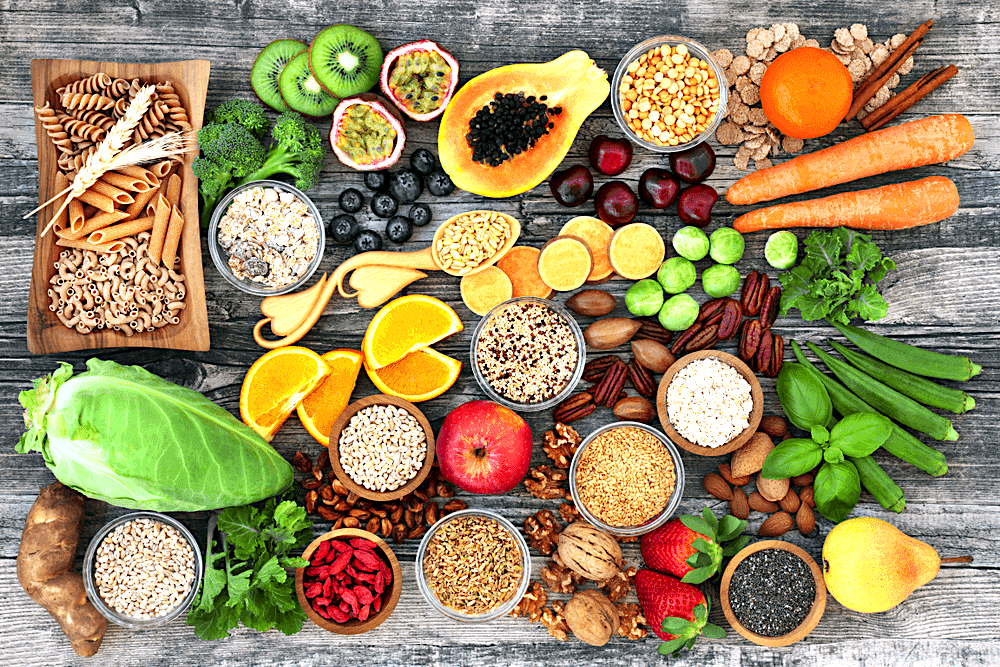This diet was initially designed by American researchers to lower blood pressure.
DASH stands for Dietary Approaches to Stop Hypertension. The DASH diet is a lifelong approach to a healthy lifestyle that’s designed to help treat or prevent high blood pressure (also known as hypertension). However, it has been found that this diet also results not only in weight loss but also helps prevent osteoporosis, cancer, heart disease, stroke, and diabetes.
The DASH diet consists of eating lots of vegetables, fruits, and low-fat dairy foods — as well as moderate amounts of whole grains, fish, poultry and nuts. It also recommends physical exercise at least 5 times a week with 30-minute sessions of moderate intensity. It is best to exercise every day.
In addition to the original DASH diet, there is a second lower sodium version of the diet. You can choose the version of the diet that meets your health needs:
- Standard DASH diet. Limited to 2,300 milligrams of sodium a day.
- Lower sodium DASH diet. Limited to 1,500 mg of sodium a day.
There are also variations of calorie plans available for those wishing to lose weight:
- 1,600 kcal for women who want to lose weight and reduce their blood pressure.
- 2,000 kcal for women who want to reduce their blood pressure or men who want to lose weight and reduce their blood pressure.
- 2,600 kcal for men who want to reduce their blood pressure.
Ask your doctor which version of the DASH diet is better for you.
Yes, You Can:
-
- Grains: 6 to 8 servings a day – Focus on whole grain bread, cereal, rice, and pasta
- Vegetables: 4 to 5 servings a day – Delicious veggies like tomatoes, carrots, broccoli, sweet potatoes, greens, and other vegetables are full of fibers, vitamins, and minerals like potassium and magnesium
- Fruits: 4 to 5 servings a day – With little preparation, turn fruits into a healthy part of a meal or snack. They’re full of fiber, potassium, and magnesium and are usually low in fat.
- Dairy: 2 to 3 servings a day – Milk, yogurt, cheese, and other dairy products are major sources of calcium, vitamin D and protein – but make sure to choose dairy products that are low-fat or fat-free.
- Lean meat, poultry, and fish: 6 one-ounce servings or fewer a day – Meat can be a source of protein, B vitamins, iron, and zinc. But choose lean varieties with no more than 6 one-ounce servings a day. By cutting back on your meat servings you can eat more healthy vegetables.
- Nuts, seeds, and legumes: 4 to 5 servings a week – Almonds, sunflower seeds, kidney beans, peas, lentils and other foods in this family are great sources of magnesium, potassium, and protein. They’re also full of fiber and phytochemicals – plant compounds that may protect against some cancers and cardiovascular disease.
- Fats and oils: 2 to 3 servings a day – Fat helps your body absorb essential vitamins and supports your body’s immune system. However, too much fat increases your risk of heart disease, diabetes, and obesity, so it must be enjoyed in moderation, with the DASH diet focusing on the healthier monounsaturated fats.
- Sweets: 5 servings or fewer a week- You don’t have to banish sweets entirely while following the DASH diet — just be reasonable. When you eat sweets, choose ones that are fat-free or low-fat, such as sorbets, fruit ices, jelly beans, hard candy, graham crackers or low-fat cookies.
No, You Can’t:
You must reduce sodium by:
- Using sodium-free spices or flavorings with your food instead of salt
- Not adding salt when cooking rice, pasta or hot cereal
- Rinsing canned foods to remove some of the sodium
- Buying foods labeled “no salt added,” “sodium-free,” “low sodium” or “very low sodium”
- Cut back on sweets, especially added sugars
- Limit your consumption of meat
- Too much alcohol can increase blood pressure. The Dietary Guidelines for Americans recommends that men limit alcohol to no more than two drinks a day and women to one or less.
- Caffeine: The impact of caffeine on blood pressure remains unclear. Caffeine may cause your blood pressure to rise temporarily – it’s best to talk to your doctor about your caffeine consumption


